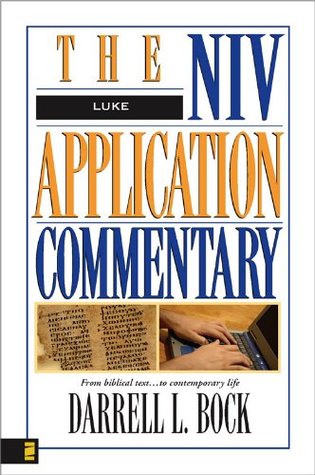Kindle Notes & Highlights
Read between
November 11 - November 11, 2017
They may justify themselves before people, but God knows their hearts. What they value highly, God detests.
“Everyone is urged insistently to enter in.”
To honor God means to be faithful to him in all areas of life.
The Christian community should be a place where transformation and growth are evident.
The details of the discussion in the afterlife, including the rich man’s ability to engage Abraham in discussion, are apocalyptic-like features in the account that show its rhetorical, parabolic, and symbolic character.
This licking is significant, since it makes Lazarus ceremonially unclean.
The rich man knows who Lazarus is. During the time on earth, he knew the poor man was out there, had needs, and even knew his name!
He still views him as beneath him, as someone who might to be sent to give him relief.
This reveals the lack of heart in ...
This highlight has been truncated due to consecutive passage length restrictions.
In effect, Abraham notes that there was a time when the rich man could have done for Lazarus what he is asking that Lazarus do for him now, but he refused to give Lazarus aid. What he measured in the past is being measured to him, only with one crucial difference: The current set-up is permanent.
God’s Word has made clear what he desires. Our devotion to him is seen in our care for others.
There is irony in this reply. What Abraham refuses for the brothers is accomplished for the readers of the parable by warnings issued for them. We hear a person in torment warn us to respond with compassion to those around us. In this parable, the grave speaks so that we might hear.
Our culture avoids such ideas by denying their truth.
The ethical call of God reveals what he expects of people. Other portions of Scripture reveal the way God enables us to accomplish this calling and to reflect his will. Enablement is graciously provided by the Spirit to those who trust in him for their spiritual well-being. In other words, what God calls for here is possible because he gives us the resources to have a compassionate and caring heart.
How we relate to God vertically influences how we relate to people horizontally.
Had the rich man merely thrown crumbs at Lazarus, that would have been only a first step. Lazarus would have needed much more care to reach restoration.
This text challenges each one of us to ask: “What am I doing?”
The parable also portrays the stubborn nature of sin. Apparently not even the resurrection is a good enough witness for some. Therefore, we need not be surprised when some do not respond to God’s call. The failure to see what God is doing applies not just to failing to see his revelation, but failing to see the evidence he leaves behind that points to his revelation.
Jesus’ parable clearly reveals that God’s ethical call is set forth in Moses and the Prophets. They are more important than any miracles God could offer, since it is his voice that speaks.
If we are to see what God wills, here is the place to find it. Scripture is worthy not just of our reading and study, but of contemplation as well. Through it we see the heart of God unto salvation.
The cultural background for this response is the angaria, where a dignitary could procure use of property for personal reasons. This right extended to people like rabbis. So the request is not unusual.4
Jesus is directing the sequence of events that leads to his death.
But while the background is regal, the ride on a humble animal denotes not a Messiah of raw power, but of humility and service.
Normally one expected the waving of branches at the Feast of Tabernacles, but this is the Passover. Tabernacles looked forward to the end times, while Passover pictured both the sacrifice for the forgiveness of sins and the final deliverance. This combination is instructive, for Jesus brings both.
Their praise of Jesus is lukewarm and follows the lead of other, more sincere followers.
One of the main proofs that the resurrection story is credible is realization that the first-century church would never have created a story whose main first witnesses were women.
The women are more responsive to what God has done than most of the gathered group of disciples. This note is important, because resurrection is a central hope of Christian faith (1 Cor. 15), but the church did not come to believe it easily.
The doubt of the disciples is set forth with crystal clarity. Their slowness to believe is not exemplary, but it is instructive. Resurrection is a doctrine that is hard to believe. For that reason the Spirit needs to work in hearts as the gospel is shared.
We should not ignore Luke’s shift to the name “Lord” here. Jesus is the one with authority, divine authority, over salvation.


